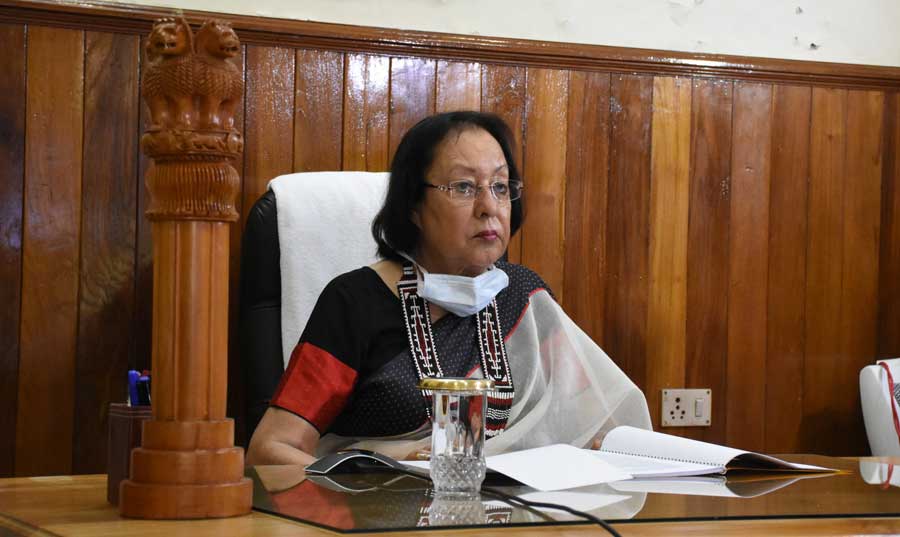
Playing fast and loose: Manipur case is yet another reminder why it's time the institution of the governor itself needs overhauling
The Manipur case is yet another reminder why it's time the institution of the governor itself needs overhauling
Pradip Phanjoubam | TT | 25.11.21: The consequences of the indiscretion of the former governor of Manipur, Najma Heptulla, in resolving the hung assembly situation in March 2017 will contaminate Manipur’s legislative history in more ways than the distaste over the unfair play immediately witnessed. It may indeed have already poisoned the state’s body politics in more durable ways. It has, for instance, encouraged the emergence of a brand of politics in which small parties are convinced that their best interests lie in not seeking pre-poll alliances, formal or informal; instead, they remain unattached so that in the event of a hung verdict, they can look for the highest bidder to make friendships of convenience.
Heptulla’s decision has also been pivotal in making the evil of political defections appear banal, inducing many in the state today to believe that the phenomenon is a universally accepted strategy in politics. They are now also comfortable with the idea that politics and morality are by nature alien to each other, and efforts to link them are superfluous, if not completely redundant.
These consequences are already unfolding in the run-up to the forthcoming assembly elections in 2022. Many winnable candidates, especially those fresh in electoral politics, are actually opting for the kingmaker parties. This rise in stakes for these parties is further increasing the likelihood of another hung verdict, ensuring the longevity of this evolving vicious cycle of unholy alliances, political defections, treacheries and back-stabbing.
As it draws to a close, the current assembly term can indeed be described as a long trail of bloodbath of disqualification tussles. Nothing can be more atrocious than the fact that even at its end, the legal status of 12 of its MLAs remains uncertain and entangled in the labyrinths of a long and winding Supreme Court case.
Just to recap, after the 2017 election, Heptulla gave the Bharatiya Janata Party, which needed the support of 10 outside members of the legislative assembly to reach the majority mark of 31, the first opportunity to form the government, rather than its rival, the Congress, which could have done it with just three more MLAs in the narrowly hung assembly.
The BJP was, therefore, compelled to sacrifice a majority of the 12 cabinet berths available under the norms set by the 10th Schedule of the Constitution, leaving all but four of its own MLAs empty-handed. The National People’s Party, which won four seats, extracted its pound of flesh of four cabinet berths, the Naga People’s Front, which won four seats, got two cabinet berths, the Lok Janshakti Party, which won only one, still got a cabinet berth, and, most shockingly, a Congress MLA, too, was given a berth in a case that should have clearly attracted disqualification under the 10th Schedule at the very start. The Speaker, Yumnam Khemchand, as well as Heptulla ignored this, that is, until the Supreme Court intervened and prohibited this minister from entering the Manipur assembly premises full two years after his defection and warned the Speaker to respect constitutional norms and disqualify him.
The BJP government had to then resort to appointing 12 of its MLAs as parliamentary secretaries, with cabinet ranks and perks, as a balm for their injured egos. This was expected to be challenged as these posts had already been described as offices of profit, liable to disqualification under Article 102 (1)(a) in earlier cases in other states. However, the recommendation on the matter by the election office was stored away by Heptulla, stalling any further progress in the case. The Supreme Court has asked Manipur’s new governor to make a decision on the matter and furnish it to the relevant authority, but now the term of the present government is as good as over.
Without a doubt, the Manipur case is yet another reminder why it is time the institution of the governor itself needs overhauling to end the tradition of the post being the eyes and ears of the party in power at the Centre. The need to keep such an eye on the states may have been thought necessary under the British colonial administration as it began conceding to pressures for more power to local governments, but should not this legacy be phased out now as independent India is set to complete its 75th year as a democracy?
Pradip Phanjoubam is editor, Imphal Review of Arts and Politics

0 Response to " Playing fast and loose: Manipur case is yet another reminder why it's time the institution of the governor itself needs overhauling"
Post a Comment
Disclaimer Note:
The views expressed in the articles published here are solely those of the author and do not necessarily reflect the official policy, position, or perspective of Kalimpong News or KalimNews. Kalimpong News and KalimNews disclaim all liability for the published or posted articles, news, and information and assume no responsibility for the accuracy or validity of the content.
Kalimpong News is a non-profit online news platform managed by KalimNews and operated under the Kalimpong Press Club.
Comment Policy:
We encourage respectful and constructive discussions. Please ensure decency while commenting and register with your email ID to participate.
Note: only a member of this blog may post a comment.